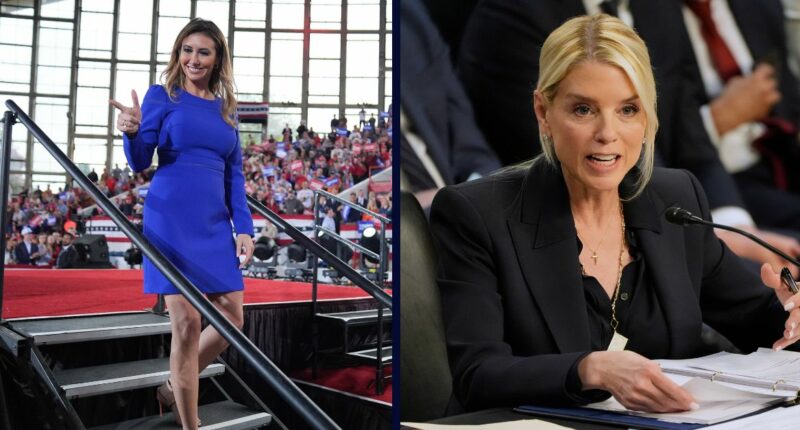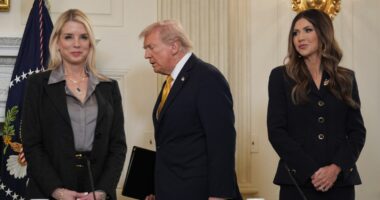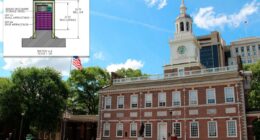Share this @internewscast.com
Left: Alina Habba walks off stage after speaking before Republican presidential nominee former President Donald Trump arrives at a campaign rally at J.S. Dorton Arena, Monday, Nov. 4, 2024, in Raleigh, N.C. (AP Photo/Evan Vucci). Right: Attorney General Pam Bondi appears before a Senate Judiciary Committee oversight hearing on Capitol Hill in Washington, Tuesday, Oct. 7, 2025. (AP Photo/Mark Schiefelbein).
In a heated courtroom exchange on Monday, the Department of Justice (DOJ) defended Alina Habba’s position as acting U.S. attorney for New Jersey. Amidst a legal challenge from criminal defendants, who argued her appointment was unlawful, the DOJ maintained her role was legitimate and essential.
The case unfolded before the 3rd U.S. Circuit Court of Appeals, with a panel comprising Judge L. Felipe Restrepo, appointed by President Barack Obama, alongside Senior Judges D. Michael Fisher and D. Brooks Smith, both appointed by President George W. Bush. The judges engaged the DOJ in a rigorous examination concerning the legal frameworks governing such appointments, highlighting the constitutional requirement for U.S. attorneys to be appointed with the Senate’s advice and consent.
Defendants Julien Giraud Jr., Julien Giraud III, and Cesar Pina, argued that Chief U.S. District Judge Matthew Brann of the Middle District of Pennsylvania correctly assessed that Habba did not lawfully execute the duties of a U.S. attorney. In August, Judge Brann ruled that the executive branch’s strategy under federal statutes, including the Federal Vacancies Reform Act (FVRA) and legal provisions for appointing special attorneys, was unprecedented. Although Brann did not dismiss the indictments against the defendants, he criticized the DOJ’s maneuvering as potentially disruptive to government function by preventing temporary appointments to over 1,000 key positions.
Alina Habba, known as a loyalist to Donald Trump and a former personal attorney, was appointed as interim U.S. attorney in March for a 120-day term, pending Senate confirmation or a federal court appointment. As her interim period neared its end without confirmation, federal judges opted not to appoint her permanently, instead selecting her then-first assistant, Desiree Grace, for the role.
The situation took a dramatic turn when Attorney General Pam Bondi accused the judiciary of political bias, asserting that “rogue judges” had undermined Trump’s executive powers. Following this, Grace was dismissed, and after Trump withdrew Habba’s pending nomination, she resigned from her interim role. Subsequently, Habba was reappointed under the FVRA as the acting U.S. attorney and designated as a “Special Attorney to the United States Attorney General,” effectively bypassing the standard appointment process.
Attorney General Pam Bondi, claiming that “politically minded” and “rogue judges” had interfered with Trump’s “core Article II powers,” swiftly fired Grace. After Trump pulled Habba’s nomination as permanent U.S. attorney, Habba resigned as interim U.S. attorney and was appointed simultaneously to the ousted first assistant’s position under the FVRA — elevating her acting U.S. attorney by default — and named Habba a “Special Attorney to the United States Attorney General.”
Henry Whitaker, counselor to Bondi, appeared on behalf of the DOJ on Monday, making the case that Habba’s appointment should stand up to scrutiny, even though he admitted under questioning at the end of arguments that the above-described set of circumstances are unique.
Whitaker insisted that there is no statutory requirement the first assistant must have held that office at the moment the vacancy arose, even as the judges collectively warmed to the idea that the normal practice is that the first assistant is not a political appointee and typically has extensive experience.
Smith asked if Whitaker would concede if the “sequence of events,” which the judge deemed “unusual,” at least had “serious constitutional implications” and appeared to be a “complete circumvention of the Appointments Clause” of the Constitution.
When Whitaker disagreed, calling Habba an “inferior officer” who reports to Bondi, the judge cracked a joke that federal judges are “used to denigration of that kind.”
Whitaker also pushed back on the notion that Congress had expressed a strong preference that such an officer be “experienced” and served in some other “comparable federal office.”
“I do not agree with that,” Whitaker said, citing as an example Secretary of State Marco Rubio’s appointment as the acting Archivist of the United States.
Whitaker defined a political appointee as someone the “agency head is allowed to remove at will,” which he said neatly applies to the first assistant position. In any event, Habba is lawfully in place by virtue of Bondi’s delegation of authority for her to act as a special attorney, the DOJ lawyer continued.
Pressed by the judges on whether Habba really could be kept in place on a “forever” basis by toying with federal statutes and regardless of time limits, as the criminal defendants claim, Whitaker answered “we colored inside the lines here.”
The DOJ attorney said there are both time limits and eligibility limits that would mean, if Habba’s nomination was submitted to the Senate again, “she would have to cease her acting service.”
At the same time, Whitaker said there would not be time limits on “performing functions by delegation” as a special attorney.
“We are applying the statutes as Congress wrote them, which are complex and sometimes require us to jump through a lot of hoops to get there,” Whitaker said.
Arguing on behalf of Pina and the Girauds was attorney Abbe Lowell, who seems to be representing just about anyone in President Donald Trump’s sights these days, whether New York Attorney General Letitia James, Federal Reserve Board governor Lisa Cook, or John Bolton. Lowell has also represented Hunter Biden.
Lowell said, in an answer to the judges’ questions of who really is Alina Habba at this moment in time, that she is a creation of a “chimera of seven different statutes” that the DOJ alternated based on whatever it is they want to call her and “depending what they are trying to accomplish.”
In Lowell’s view, Whitaker had “conceded” that “there is no outside limit” on Habba by operating under the delegation of Bondi’s authority, making her in effect a potential “forever appointment” who can “do everything” a U.S. attorney can do without the actual “gravitas” of the title and without Senate confirmation — rendering several statutes “superfluous” and despite the Appointments Clause.
“They have now constructed a way in which somebody never has to be nominated and confirmed and can serve all the functions of a U.S. attorney forever,” Lowell said. “There has never been, except for the way this administration is constructing and asking you to concur that you can delegate all the powers of a U.S. attorney by making that person the delegable 515 special attorney. That’s never happened, and it’s not even the words of statute.”
The court also allowed James Pearce to briefly argue on behalf of amicus the Association of Criminal Defense Lawyers of New Jersey.
Pearce echoed Lowell by stating that to bless this legal maneuvering would be to bless Bondi’s, or any future AG’s, setting up of a “shadow government of delegated U.S. attorneys throughout the country.”
“That just can’t be right, and for those reasons, the court should affirm” the judgment below, Pearce said.
On rebuttal, at the very end of arguments, Whitaker stated that there have been examples of individuals “timed out as acting United States attorney under the FVRA have continued to exercise the functions or duties of that office by delegation.”
“And no one seemed to think that was a problem” until Alina Habba, Whitaker said.
One of the judges then interrupted on that point, reciting the whole history of how Habba came to be installed, stating the challenge of her authority is not personal at all.
“Nothing about this involves [… ] Ms. Habba personally,” Smith said. “This is about the statute. This is about the separation of powers. This is about an important position within the firmament of our government. This is about process, which is what the system that we operate under every day is all about, whether it’s due process or whether it’s just process provided by procedural rules or substantive law. And so I just want to say that, and I’m sure my colleagues agree that this is not a personal thing, so I wanted to give you an opportunity to indicate whether that was your suggestion or not.”
Whitaker walked back his argument slightly, simply saying that what the government has done is “consistent with long standing practice, and in many of those instances, that practice went unchallenged.”
That remark did not go over well at all, as the judge went over the history of Habba’s appointment, resignation, and reappointment and distinguished it from “common practice.”
“Can you come up with an example of any time that such a concatenation of events has occurred with respect to the appointment of a United States Attorney?” Smith asked.
“Well, I guess I cannot,” Whitaker answered, nonetheless claiming that there have been analogous situations.
The implications of an eventual Habba ruling, whether upholding her authority or affirming her lack of it, could be far-reaching. When acting U.S. Attorney Sigal Chattah was disqualified in Nevada, for example, the judge repeatedly cited the Habba case when reaching that conclusion. And other temporary U.S. attorneys face similar challenges.
James Comey is launching a challenge of interim U.S. Attorney Lindsey Halligan’s authority to prosecute him. The former FBI director already signaled he would rely on the Habba and Chattah disqualifications to make his case that Halligan, a former attorney for Trump like Habba, was unlawfully appointed.
That motion was expected to drop Monday, the same day as oral arguments.
















